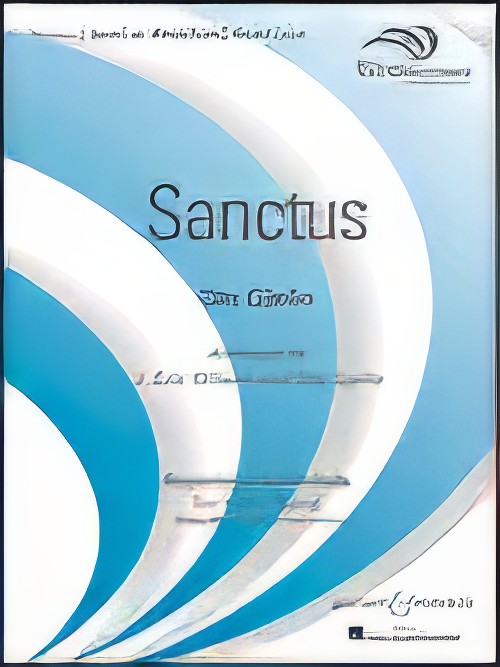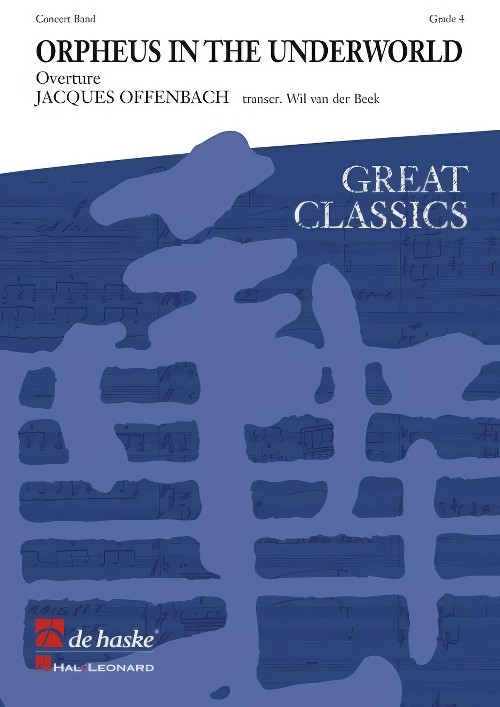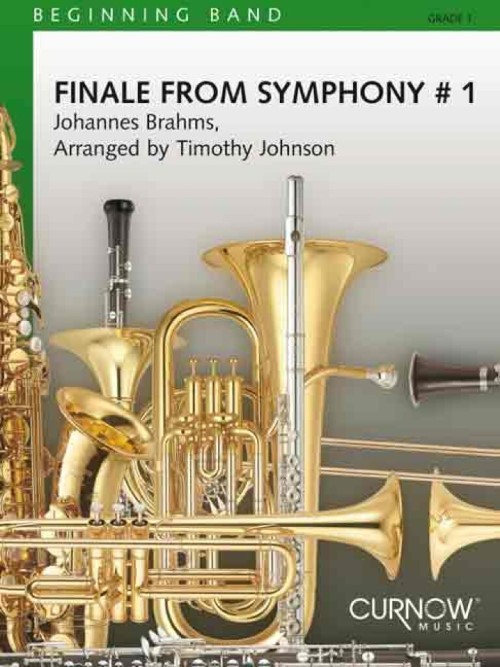Results
-
 £84.99
£84.99Animal Kingdom Wind Band Set (Score & Parts)
In this composition William Vean takes you on a journey through the fascinating and exciting world of animals. Apart from it being a composition filled with "special effects", Animal Kingdom contains many educational elements, such as playing in swing (triplets feeling), chromatics, flutter tonguing, gypsy tuning, varying keys, and, of course, dynamics and articulation. The melodic lines occur in all four voices, as well as in all percussion parts, providing each musician with the opportunity to play a solo or to accompany. Highly recommended for your youth band! William Vean is an educational composer. He knows how to musically shape the special elements from our daily lives. His music is therefore very expressive, containing creative solutions to possible problems. Special ways of playing make his music particularly interesting for the winds, but the percussion section is also featured in his special effects. The world of the animals always plays on ones imagination. In Animal Kingdom, William Vean has portrayed a number of animals in a special manner: Kevin Kangaroo - The jumping character of this animal can be heard in different voices. The swing style also emphasizes the characteristic movements of the kangaroo. Playing in swing style can be practised by using scales. Eddy Elephant - For some of his smaller fellow fauna friends this can be quite an ordeal, but for Eduard (Eddy for friends and intimates) it is his daily walk. Baldrick Bat - Baldrick the Bat is a mysterious character. This can be heard in the fast moving valves and keys, accompanied by special effects in the percussion section. Curtis Camel - Curtis the Camel trudges across the desert, feeling bored. The idea that the horizon will never change does not affect him anymore. He has accepted his fate. The distinctive tones from the gypsy scale provide the suitable oriental sounds. Betty Butterfly - Butterfly Betty elegantly, and without worries, flutters from flower to flower in the garden. Her motto: Carpe Diem (Seize the Day). Betty is a one-day butterfly. Marvin Monkey - A "swing" monkey stirs up the feelings. Even members of the orchestra will look like real monkeys. How about your audience? Each part has its own difficulties and challenges. Important in the first part is playing "in swing" (triplets feeling). This can be practised using scales. In the second part ensemble playing and balance are important. In Baldrick additional information on the effects that have to be played might be useful. "New" sounds are, of course, welcome. Curtis the Camel introduces the gypsy scale. Additional explanation of the use of the scale might be useful. Key changes are interesting in this part. A slight accent on the first beat of the bar will add to the charm of this part. Marvin the Monkey brings back the swing rhythm that was introduced in the first part, alternated by a "straight" part with attention to chromatics and articulation. A story teller will definitely be an asset when performing this composition. 07:30
Estimated dispatch 7-14 working days
-
 £89.99
£89.99Auld Lang Syne Wind Band Set (Score & Parts)
Whereas 'Auld Lang Syne' may be considered the best-known Scottish song ever, yet at the same time it is an obscure one, for there are but few people who know the complete text by heart. After the familiar 'Should auld acquaintance be forgot .....' many people take their refuge to lyrics like 'rum tee dum ta dee ..... lah, lah, lah ........... for auld lang syne'. Even in Scotland only a handful of persons know the entire text and are able to give a correct rendering of it. The current lyrics have been attributed to the Scottish poet Robert Burns. Burns, however, he did not write the whole poem : after he had heard an old man sing the centuries-old Scotch ballad, he wrote it down and added a number of stanzas (1788). Historical research teaches us that the ballad served many purposes, both political and religious. Nowadays, 'Auld Lang Syne' is sung as a Christmas Carol and it is also sung on New Year's Eve at the turning of the year. Apart from that, though, the song is also sung on many other occasions - sometimes with different lyrics, which usually have Love, Friendship and/or Parting as their themes, as these go well with the fascinating melody. In this arrangement a low-sounding solo instrument is central. The harmonization in the accompaniment fits in perfectly with the sentiments this song will evoke. Should auld acquaintance be forgot And never brought to mind? Should auld acquintance be forgot. And days of auld lang syne? For auld lang syne, my dear, For auld lang syne, We'll take a cup of kindness yet, For auld lang syne. 03:00
Estimated dispatch 7-14 working days
-
 £149.40
£149.40Lamento - Jerker Johansson
Lamento was composed in memory of Bjarne Haug Thesen (1957-2023). Bjarne came from Nord-Odal and had his musical base in Mo Skolemusikk and Nord-Odal Hornmusikk. In 1987, he was elected vice-president of the Norwegian Band Ferderation (Norges Musikkorps Forbund - NMF), a position he held until 1990. He was an important contributor to the development of the organization and is remembered for his knowledge, bold thoughts and winning spirit. Bjarne had this gift of delivering stories that fit to the issues that were up for debate, and if things started to get a little heated, these inputs from Bjarne often ensured that the debate got back on track. He was on the editorial board for the book "Norske musikkorps" which was published in 1990, and was also involved in the 100th anniversary of the NMF in 2018. Lamento was premiered on the 13th of December 2023 by Oslo Postorkester conducted by Stina Widn.
Estimated dispatch 7-14 working days
-
£127.00
The King of Siam (CB) - Pimpanit Karoonyavanich
Many foreigners who travel to Thailand for the first time always wonder why Thai people love their king so much, even more than their own life. However, that question is quickly answered after they realize how much our king sacrifies his life to develop Thai people's way of living especially the poor ones. He proves that the "love" from his people doesn't come from his birth as the royal family, but from his hard-working. As a Thai composer, Pimpanit wrote this piece out of her love and gratefulness she has to her beloved king of Thailand, His Majesty King Bhumibol Adulyadej, in the occasion of his 88 years old birthday. At this moment he already marks 70 years on the throne and he is also the world's longest-reigning living monarch, ascended to the throne. "Siam" was the name of Thailand before 1948.
Estimated dispatch 7-14 working days
-
 £85.00
£85.00Sanctus (Concert Band - Score and Parts) - Gjeilo, Ola - Wilson, J. Eric
Ola Gjeilo, born in 1978 in Norway, moved to the United States when he was 23 years old to study composition at the Julliard School. He composed this dense and richly textured setting of the Sanctus for the Uranienborg Vokalensemble shortly after he graduated in 2006. Eric Wilson has skilfully captured the magic of the original choral work in this transcription for winds. Ola Gjeilo stated the following regarding Sanctus: It's one piece of mine that remains closest to my heart.Duration: 4:20
Estimated dispatch 7-14 working days
-
 £137.99
£137.99Orpheus in the Underworld (Concert Band - Score and Parts) - Offenbach, Jacques - Van der Beek, Wil
Jacques Offenbach was born in 1819 in Cologne, Germany, but as a child he moved to Paris where he received a thorough musical education. In his operetta Orpheus in the Underworld, Offenbach parodies the famous Greek legend of Orpheus and Euridice. Indirectly, however, he criticises the complacency of many of his contemporaries. The overture was not written entirely by Offenbach, Carl Binder added various pieces to it for a Viennese production of this operetta in 1860 and since then, these pieces have remained part of the composition. This appealing transcription includes the famous Can Can which is sure to get your audience high kicking in the aisles!Duration: 9:15
Estimated dispatch 7-14 working days
-
 £94.99
£94.99Pilgrims' Swing (Concert Band - Score and Parts) - Lloyd, Graham
The Andante from the first movement of Mendelssohn's Italian Symphony (often nicknamed Pilgrims' March) contains the most beautifully haunting melody supported by the simplest of bass lines and counterpoint figures. As a young musician, Graham Lloyd was so fascinated by this music he bought the orchestral score to study the notes, which at the time made little sense to him. However, he did notice that the bass line was similar to a "walking bass" line in a standard swing tune.In this composition Graham Lloyd uses Mendelssohn's original bass line, melodic line and counterpoint figures but gives them a swing feel. Who knows, maybe if Mendelssohn had been born a hundred years later, he could have become one of our big band leaders!Duration: 5:15
Estimated dispatch 7-14 working days
-
 £64.99
£64.99Symphony No.1, Finale from (Concert Band - Score and Parts) - Brahms, Johannes - Johnson, Timothy
Brahms was known to be extremely careful when composing his music. When he decided to compose a symphony he wanted to be sure to exceed the standard that had been set by Beethoven. His first symphony, completed in 1876 when he was 43 years old, took several years to complete because of his attention to detail. This arrangement of the theme from the finale highlight the long, flowing nature of Brahms' melodies. A real treat for any band.Duration: 2.15
Estimated dispatch 7-14 working days
-
 £71.28
£71.28A Kind And Gentle Soul
This prolific composer has penned many beautiful pieces. On this occasion, he has created yet another powerful and expressive composition that is highly reflective in nature. Composed in honor of a young boy who passed away far too soon, this emotional work is scored to evoke the kind traits that he displayed to the many people whose lives he touched. Truly inspiring!
Estimated dispatch 7-14 working days
-
 £139.99
£139.99Light Cavalry Wind Band Set (Score & Parts)
Although he was born in Split, Croatia, of Belgian descent, Franz von Supp?'s nationality is defined less by his actual descendents than by the country and city where he lived and worked and had the great majority of his success, the Austrian capital, Vienna. It was here where, with assistance from the Johan Strausses and Franz Lehar, he helped to assure Vienna's reputation as the operetta capital of the world. He achieved this by pioneering operetta as a major medium for the theatre. The overture to Light Cavalry is one of his two most famous works, the other being the Poet and Peasant Overture written as incidental music for a play of the same name. 0:06:45
Estimated dispatch 7-14 working days
